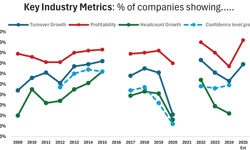When does a magazine get so digital it's not a magazine?
In May, Condé Nast announced the closure of Easy Living. This company don't often close magazines so it was an unusual move for them. Nicholas Coleridge's statement followed familiar form however in pointing out that while the magazine was struggling at the newsstand, "our digital reach far outweighs that of print and Easy Living is thriving online".
Whenever a magazine folds with the promise to continue online, I always make a point of checking back a few months later to see how much of that promise has been fulfilled. I generally find that if they have survived at all, it's as a fairly hollow offering which doesn't seem to have been touched by the hand of either staff or readers since the magazine put up its shutters.
Easy Living may be different. Their website is certainly very well developed and it's easy to imagine it remaining popular. It reflects the magazine's roving brief across homes, fashion and food with lots of list features such as 50 Foods To Make You Look Younger and 21 Ways To Pimp Your Garden, many of which consist of very short items plus product shots and details of where to buy. In some cases, this is made even easier for you with a direct link to e-commerce. Since there's no future in banner advertising, we must assume that these kinds of links play some part in the site's plan for a sustainable future.
There's no use denying that glossy women's magazines have always lived closer to the retail interface than most media this side of the shopping channels. Once you take the content of a magazine like Easy Living and edit it appropriately for the internet, there is barely any interface left because you're no longer flicking and reading, you're browsing and buying. So there's your big imponderable thought for the summer. At what point in a magazine's migration from paper to digital does it cease being a magazine altogether and just turn into some kind of bazaar?
The word "magazine" derives from the world of ammunition and it's traditionally been a package, a selection, an edit, and there's been an implicit understanding that although you may prefer some elements to others, you accepted the package in its entirety when it was presented to you every month. A website doesn't work this way, no matter what it derives from. It's a fathomless inventory containing more things than you could possibly get through at a sitting and it's understood that what brings you to its portals is the need to serve a consumer want rather than the usual nebulous desire for entertainment and inspiration.
I'm not against this transformation - the reader doesn't have to pay after all and all the magazine's material remains there forever rather than being whisked away as soon as the magazine comes off sale - but in this not quite so brave new world, it's going to take an increasingly clued-up public to be able to detect the difference between editorial, branded content and so-called "native" advertising, which is like advertorial but a whole lot less shy about it, and between genuine feedback and so-called "astroturfing", in which superficially disinterested people on social media are actually working for the firms whose products they praise.
Quiet at the back!
Attending the PPA Awards as a judge is always an interesting experience. It's best to nail down starting blocks at the beginning of the evening so that you can retreat the minute the last gong is handed out for fear you get your chest stabbed by the accusing finger of some over-refreshed executive who feels their title has been overlooked.
Some things about awards ceremonies remain the same. If you win, it's a sensible recognition of your qualities which is, frankly, long overdue. If you don't win, it's a sham, a stitch-up, a brazen distortion of the truth which is frankly all you could expect from something within the gift of a trade body who do their dark work far, far away from public scrutiny.
A star guest (in this case Mariella Frostrup, pictured) will make some jokes about magazines which will be met with at best lukewarm amusement. These will involve the observation that there seems to be a magazine for every interest and state of mind and wouldn't it be funny to juxtapose them in humorous fashion.
Because there aren't any stars in the world of magazines, they always have to be parachuted in from broadcasting, with predictable consequences. I was once seated next to an incredibly famous news broadcaster who had been hired as the star turn at a magazine function. Over the starter, it became clear to me that he hadn't done any preparation at all and his familiarity with the world of magazines didn't extend much further than having driven past WH Smith once. When he got up to make his remarks, he died, in the words of PG Wodehouse, like a louse in a Russian's beard.
Mariella Frostrup was a lot better than that and soldiered bravely on in face of the one thing about awards ceremonies that has changed, which is the increasing rudeness of some people in just keeping talking when there is a category with which they're not directly concerned. (Since the number of categories always increases exponentially this will apply to an increasing number of them.) These people's attention span falls away in direct proportion to their distance from the stage in a lateral direction, which is always a problem in the cavernous space that is the Great Room of the Grosvenor House. PPA CEO Barry McIlheney tells me that in the past, they tried to engage one beloved entertainer to present the awards and were told that, despite his having played down the bill at Vegas and the Glasgow Empire, there was no way he was going to work the Great Room because he had once had an unspecified but "unpleasant experience" there.
I wish I could see an end to some people's habit of keeping up an entire conversation, as opposed to mumbling or interjecting, while there is business being conducted on the stage. Alcohol has something to do with it but it's the same when you go to any public event. I suspect it's the inevitable consequence of people being asked for their opinion and feedback about everything from the single currency to the name of Kim Kardashian's baby. They feel that they're less than completely human when they're not giving out.
No such thing as bad publicity?
It's very good news that there was such a controversy around Vice Magazine's fashion spread based on the highly amusing idea of famous women writers who killed themselves. (It included some who didn't actually kill themselves but if it’s veracity, consistency and cultural hinterland you're looking for, my general advice would always be, don't go looking in the fashion department.) It was excellent news for the medium to know that so many people could be outraged by something in a magazine. Of course most of them weren't outraged by coming across a copy in WH Smith because you can't get the magazine there. Vice is carefully distributed for free through retail outlets so dark and inscrutable and far into Shoreditch that the likes of you would probably walk straight past them thinking they were minicab offices.
No, they were outraged after seeing the same pictures on the magazine's site, having been led there by the links posted on Facebook and Twitter by the people who were mad keen to show that they were foremost among the ranks of the outraged. Actually, people are so commonly expected to show outrage and offence nowadays and to pass it on to others as quickly as possible that it's quite likely that a lot of the people joining the chorus hadn't actually seen the pictures in question. And now they've been pulled from the website as well, not before driving the magazine's brand up the Google rankings and getting it worldwide publicity. I would imagine who ever had the idea will have been handsomely rewarded.












